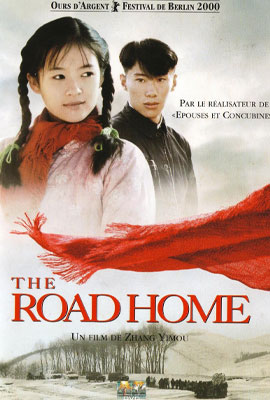
(1999)
directed by Yang Yimou
“The Road Home” is a sublimely beautiful film that tells the tender, heartwarming story of a young woman’s enduring love. The film opens in the village of Sanhetun in remote, northern China where the elderly widow, Zhao Di, is awaiting the arrival of her son, Luo Yusheng, from the city. He has come to help his mother with the funeral arrangements for his father, Luo Changyu, the village schoolteacher. His father died of heart failure while traveling from village to village in the winter in an effort to raise funds to rebuild the village schoolhouse.
Chinese culture has many traditions associated with the funeral process and the honoring of departed ancestors. One of the most important traditions is ensuring that the spirits of ancestors are able to find their way home in the afterlife. Luo’s mother can’t accept the suggestion that the coffin be brought home from the hospital by tractor and insists that they follow the age-old custom of having it carried by local men so that her husband’s spirit will not forget the way home.
Luo Yusheng agrees to honor his mother’s wishes but faces a serious challenge. He is told by the mayor of the village that it might be difficult to find enough porters to carry the father home because there are few able bodied young men left in the village. The mayor and the son reach an agreement on the price to be paid to hire porters from the surrounding area. Zhao Di also wants to weave a shroud for her husband’s coffin. This requires that Luo Yusheng pay for the repair of an ancient loom for her to use to weave the funeral shroud.
After attending to all the funeral arrangements, Luo Yusheng takes a moment to reminisce about his parents’ marriage. The story of his parents’ courtship is so famous that it has gained the status of a legend in the village. The opening scenes are filmed in a melancholy bluish gray. The movie suddenly bursts into brilliant color as the past is recalled. We meet Zhao Di (Zhang Ziyi), an enchantingly beautiful young woman who lives in poverty with her blind grandmother.
An extraordinary sensitivity to the changing seasons is revealed through shots of the village nestled in the hills in the dead of winter and of golden fields of grain standing tall in the late summer. A major influence on ‘‘The Road Home,’’ Mr. Zhang has said, is contemporary Iranian cinema, especially the movies of Abbas Kiarostami. The beauty of the countryside in “The Road Home” reminds me of Kiarostami’s poetic landscapes. (I review Kiarostami’s film “Where Is The Friend’s House” in chapter seven.)
When Luo Changyu, the handsome, young schoolteacher arrives in the village, the entire town turns out to welcome him and Di immediately falls in love with him. As the most beautiful maiden in the village, Di has been assigned to weave a bright red banner to hang in the new schoolhouse for good luck. Changyu can’t help but notice the radiant girl in the bright red jacket!
In the first days after Changyu arrives, Di never misses an opportunity to cross paths with Changyu. Each day, she lovingly prepares a hot meal which she delivers to the construction site where the new schoolhouse is being built. She hopes that Changyu will choose it for his lunch from among the dishes brought by the other women of the village.
It has been decided that the new schoolteacher will have dinner with a different family each evening. When it is Di’s turn to have Changyu over for dinner, she is beside herself making sure everything is perfect for his visit.
Di lovingly weaves the traditional red cloth to be wound around the school house rafters. When the schoolhouse is finished, she stands outside listening to the sound of Changyu’s voice as he drills the students in traditional calls and responses.
Unfortunately, China is in the midst of a political upheaval and one day Di learns that Changyu must return to the city for questioning by the authorities. Before he departs, Changyu gives Di a tortoise-shell hair clasp as a token of his affection along with a promise to return in a few weeks.
Physical objects are treated reverently in the film. A lengthy section of the film shows an artisan repairing a broken porcelain bowl using ancient techniques. The repair of the ancient loom so that Di can weave the funeral shroud resonates deeply and connects the present to a timeless past in which artisans put part of themselves into the objects they created.
Di is beside herself as the day of Changyu’s expected return comes and goes with no sign of him. When she can stand it no longer, she sets out in a snowstorm to track him down in the city. One of the villagers finds her collapsed on the roadside and brings her home, where she becomes very ill.
When Changyu hears the news of her illness, he returns without permission to be by her side. This act of disobedience costs the two lovers another two years of separation. When Changyu finally returns to Sanhetun, however, the two are never parted again until his death.
The movie returns to the present. When the funeral procession sets out, more than a hundred people show up to help carry home the casket of the man who taught generations of village children. The mayor returns the money to the son because no one will accept payment for doing what they consider to be an honor rather than a job.
On the day the son is leaving to return to his job in the city, he fulfills his father’s dream and teaches a class in the old schoolhouse using the textbook his father had written. “Know the past, know the present,” chant the students.